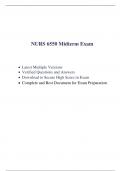-
1. Exam (elaborations) - Nurs 6501 final exam (4 versions, 400 q & a, latest-2023) / nurs 6501n final exam / n...
-
2. Exam (elaborations) - Nurs 6501 midterm exam (4 versions, 400 q & a, latest-2023) / nurs 6501n midterm exam...
-
3. Exam (elaborations) - Nurs 6501 week 1, 2, 3, 4, 5, 6, 7, 8, 9, 10, 11 quiz (2 versions of each quiz) / nu...
-
4. Exam (elaborations) - Nurs 6512 final exam (7 versions, 700 q & a, latest-2023) / nurs 6512n final exam / n...
-
5. Exam (elaborations) - Nurs 6512 midterm exam (7 versions, 700 q & a, latest-2023) / nurs 6512n midterm exam...
-
6. Exam (elaborations) - Nurs 6512 week 1, 2, 3, 4, 5, 6, 7, 8, 9, 10, 11 quiz (2 latest versions of each quiz...
-
7. Exam (elaborations) - Nurs 6521 final exam (7 versions, 700 q & a, latest-2023) / nurs 6521n final exam / n...
-
8. Exam (elaborations) - Nurs 6521 midterm exam (4 versions, 400 q & a, latest-2023) / nurs 6521n midterm exam...
-
9. Exam (elaborations) - Nurs 6521 week 1, 2, 3, 4, 5, 6, 7, 8, 9, 10, 11 quiz (2 latest versions of each quiz...
-
10. Exam (elaborations) - Nurs 6531 final exam (2 versions, 200 q & a, latest-2023) / nurs 6531n final exam / n...
-
11. Exam (elaborations) - Nurs 6531 midterm exam (2 versions, 200 q & a, latest-2023) / nurs 6531n midterm exam...
-
12. Exam (elaborations) - Nurs 6531 week 1, 2, 4, 6, 7, 9, 11 quiz / nurs 6531n week 1, 2, 4, 6, 7, 9, 11 quiz ...
-
13. Exam (elaborations) - Nurs 6541 final exam (3 versions, 300 q & a, latest-2023) / nurs 6541n final exam / n...
-
14. Exam (elaborations) - Nurs 6541 midterm exam (3 versions, 300 q & a, latest-2023) / nurs 6541n midterm exam...
-
15. Exam (elaborations) - Nurs 6541 week 1, 2, 3, 4, 5, 6, 7, 8, 9, 10, 11 quiz (2 latest versions of each quiz...
-
16. Exam (elaborations) - Nurs 6550 midterm exam (2 versions, 200 q & a, latest-2023) / nurs 6550n midterm exam...
-
17. Exam (elaborations) - Nurs 6550 final exam study guide / nurs6550 final exam study guide / nurs 6550n final...
-
18. Exam (elaborations) - Nurs 6550 midterm exam study guide/ nurs6550 midterm exam study guide / nurs 6550n mi...
-
19. Exam (elaborations) - Nurs 6550 final exam (3 versions, 300 q & a, latest-2023)/ nurs 6550n final exam / nu...
-
20. Exam (elaborations) - Nurs 6551 final exam (5 versions, 250 q & a, latest-2023) / nurs 6551n final exam / n...
-
21. Exam (elaborations) - Nurs 6551 midterm exam (3 versions, 150 q & a, latest-2023) / nurs 6551n midterm exam...
-
22. Exam (elaborations) - Nurs 6551 week 1, 2, 3, 4, 5, 6, 7, 8, 9, 10, 11 quiz (latest- 2023)/ nurs 6551n week...
-
23. Exam (elaborations) - Nurs 6560 final exam (2 versions, 200 q & a, latest-2023) / nurs 6560n final exam / n...
-
24. Exam (elaborations) - Nurs 6560 midterm exam (100 q & a, latest-2023) / nurs 6560n midterm exam / nurs6560 ...
-
25. Exam (elaborations) - Nurs 6630 final exam (5 versions, 375 q & a, latest-2023) / nurs 6630n final exam / n...
-
26. Exam (elaborations) - Nurs 6630 midterm exam (5 versions, 375 q & a, latest-2023) / nurs 6630n midterm exam...
-
27. Exam (elaborations) - Nurs 6640 final exam (5 versions, 375 q & a, latest-2023) / nurs 6640n final exam / n...
-
28. Exam (elaborations) - Nurs 6640 midterm exam (5 versions, 375 q & a, latest-2023) / nurs 6640n midterm exam...
-
29. Exam (elaborations) - Nurs 6650 final exam (3 versions, 225 q & a, latest-2023) / nurs 6650n final exam / n...
-
30. Exam (elaborations) - Nurs 6650 midterm exam (4 versions, 300 q & a, latest-2023) / nurs 6650n midterm exam...
-
31. Exam (elaborations) - Nurs 6660 final exam (2 versions, 150 q & a, latest-2023) / nurs 6660n final exam / n...
-
32. Exam (elaborations) - Nurs 6660 midterm exam (2 versions, 150 q & a, latest-2023) / nurs 6660n midterm exam...
-
33. Exam (elaborations) - Nurs 6670 final exam (latest-2023) / nurs 6670n final exam / nurs6670 final exam / nu...
-
34. Exam (elaborations) - Nurs 6670 midterm exam (latest-2023) / nurs 6670n midterm exam / nurs6670 midterm exa...
-
35. Exam (elaborations) - List of exam
-
36. Exam (elaborations) - List of exam
-
Show more




